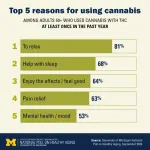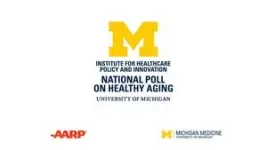(Press-News.org) Whether they’re using it for recreational or medical reasons, a sizable percentage of people in their 50s and older have smoked, eaten, drunk or applied to their skin at least one form of cannabis in the past year, a new poll shows.
In all, 21% of people age 50 and older said they used a form of cannabis that contains the psychoactive compound THC at least once in the past year, according to new findings from the University of Michigan National Poll on Healthy Aging. The poll report focuses on use of cannabis products with psychoactive amounts of THC, not CBD-only products.
More than half of those who used a cannabis product did so frequently: 12% of adults aged 50 and older said they did so at least once a month. Those aged 50 to 64, and those who are in fair or poor physical health, or in lower income households were more likely to report using cannabis at least monthly.
As for the reasons older adults use cannabis, many cited sleep (68%), help with pain (63%) or mental health (53%), and/or to relax or feel good (81%).
The poll also reveals potential risky behaviors related to cannabis use.
Among those who use cannabis at least once a year, 20% said they had driven a vehicle within two hours of consumption; many experts recommend waiting two or even three times that long. And the rate of such driving was even higher – 27% – among those who use cannabis at least once a month.
In addition, nearly half of older adults who use cannabis products at least monthly had not discussed their use with their health care provider. And more than 20% reported at least one sign of potential dependence on cannabis.
The poll is based at the U-M Institute for Healthcare Policy and Innovation, and supported by AARP and Michigan Medicine, U-M’s academic medical center.
Erin E. Bonar, Ph.D., a U-M addiction psychologist who worked with the poll team on the report, says the findings suggest a need for action at the policy, clinical and community levels to identify those who may need treatment for cannabis addiction and to discourage driving or other risky behaviors after consumption.
“With some form of cannabis use now legalized in 38 states and on the ballot this November in several others, and the federal rescheduling process under way, cannabis use is likely to grow,” she said. “But as this poll shows, it is not risk-free, and more attention is needed to identify and reduce those risks.”
Bonar is a member of IHPI, the U-M Addiction Center and the U-M Injury Prevention Center as well as a professor in the Medical School Department of Psychiatry.
In addition to the national poll report, the team compiled data for Michigan adults age 50 and older compared with those in other states; a summary is available at https://michmed.org/JYJer and an interactive data visualization is available at https://michmed.org/4e2KW.
Cannabis potency and addiction: Views of all older adults
The poll team also asked all older adults – including those who don’t use cannabis – about their views of cannabis. The results suggest a need for more public awareness efforts, Bonar says.
People in their 50s and beyond may have familiarity with cannabis from decades ago, whether through direct use or indirect knowledge during a time when it was illegal for any use in all states. Because of this, the poll team asked whether they believe cannabis is stronger today than it was 20 to 30 years ago.
The vast majority – 79% -- of older adults said they thought this was true. But Bonar notes that this means 21% aren’t currently aware of the major increases in THC levels found in cannabis available today, compared with levels in the 1990s and before.
Meanwhile, 72% of all older adults said they believe people can become addicted to cannabis. But, Bonar notes, this means more than a quarter of older adults aren’t currently aware that research has shown conclusively that cannabis addiction is real and can affect someone’s life and health just as addiction to other substances can.
Importance of discussing with health care providers
For those who use cannabis, especially those who use it often, poll director Jeffrey Kullgren, M.D., M.P.H., M.S. says the poll findings show the importance of communicating with their health care provider about their use.
In all, 56% of those who use cannabis with THC at least monthly said they had spoken with their regular health care provider about their use. Most of them said they had brought the topic up.
Talking openly with a provider about use could help identify risky drug interactions, and spot those experiencing signs of cannabis dependence or addiction.
In all, 22% of those who use cannabis at least monthly said in the past year they had had to use more cannabis to feel the effect they wanted, and 21% said using the same amount of cannabis had less of an effect on them than it had before, while 17% said they had increased the amount or frequency of their cannabis use. Another sign of potential addiction – strong desires or cravings to use cannabis with THC – was reported by 13% of those who use cannabis at least monthly.
“Even if your doctor, nurse practitioner or pharmacist doesn’t ask if you’re using cannabis products, it’s important to offer this information, no matter whether you’re using it to address a physical or mental health concern, or simply for pleasure,” says Kullgren, a primary care physician at the VA Ann Arbor Healthcare System and associate professor of internal medicine at U-M. “Many prescription medications and over-the-counter drugs, as well as alcohol, can interact with cannabis and cause unexpected or unwanted effects. And there are only a few conditions where we have good evidence of a medical benefit from cannabis, though this could change with time.”
The current process at the federal level to change how cannabis is listed on the schedule of controlled substances may free more researchers to do studies of cannabis-derived products in clinical trials involving human volunteers. Right now, such research is very limited because of federal restrictions.
The poll report is based on findings from a nationally representative survey conducted by NORC at the University of Chicago for IHPI and administered online and via phone n February and March 2024 among 3,379 adults ages 50 and older. The sample was subsequently weighted to reflect the U.S. and Michigan populations. Read past National Poll on Healthy Aging reports and about the poll methodology.
END
Cannabis and older adults: Poll shows current use patterns, beliefs and risks
Among people age 50 and up, 21% used cannabis in the past year and 12% partake at least monthly; signs of risky driving, potential addiction seen
2024-09-12
ELSE PRESS RELEASES FROM THIS DATE:
Dr. Baptiste Lacoste, of the Ottawa Hospital Research Institute and uOttawa Brain and Mind Research Institute, receives a SynGAP Research Fund (SRF) Grant for Groundbreaking Research on Vascular and M
2024-09-12
Mill Valley, CA – September 12, 2024 – The SynGAP Research Fund 501(c)(3) announces a $128,888 grant to Dr. Baptiste Lacoste at the uOttawa Brain and Mind Research Institute (uOBMRI) and Ottawa Hospital Research Institute (OHRI). This grant supports Dr. Lacoste's pioneering research project aimed at exploring the role of vascular and metabolic dysfunction in SYNGAP1-Related Non-Syndromic Intellectual Disability (SYNGAP1-NSID), also known as SYNGAP1-Related Disorders (SRD).
With elevated energy demands and a limited capacity to store ...
$75,000 prize inspired by 18th century Scots economist attracts global entries
2024-09-12
A Scottish $75,000 prize for “radical innovation” has shortlisted four academics from around the world.
Named after Panmure House, the former Edinburgh home of 18th century Scots economist and philosopher Adam Smith, the Panmure House Prize rewards groundbreaking research that contributes to advancing long-term thinking and innovation.
After a record number of entries for the 2024 prize, its fourth year, the judges have drawn up a shortlist of four submissions from the United States, Spain ...
SOPHiA GENETICS announces poster presentations at ESMO 2024
2024-09-12
Boston, MA and Rolle, Switzerland, September 12, 2024 – SOPHiA GENETICS (Nasdaq: SOPH), a cloud-native healthcare technology company and a global leader in data-driven medicine, will be presenting multiple posters at the European Society for Medical Oncology (ESMO) Congress 2024 being held in Barcelona, Spain September 13-17, 2024. The ESMO Congress is a globally influential oncology platform for clinicians, researchers, patient advocates, journalists and healthcare industry representatives from all over the world.
The details of the presentations are as follows:
Title: ...
New fossil fish species scales up evidence of Earth’s evolutionary march
2024-09-12
Access VIDEO, photos and captions here
Climate change and asteroids are linked with animal origin and extinction – and plate tectonics also seems to play a key evolutionary role, ‘groundbreaking’ new fossil research reveals.
The discovery of an exceptionally well preserved ancient primitive Devonian coelacanth fish in remote Western Australia has been linked to a period of heightened tectonic activity, or movement in the Earth’s crust, according ...
Personal carbon footprint of the rich is vastly underestimated by rich and poor alike, study finds
2024-09-12
The personal carbon footprint of the richest people in society is grossly underestimated, both by the rich themselves and by those on middle and lower incomes, no matter which country they come from. At the same time, both the rich and the poor drastically overestimate the carbon footprint of the poorest people.
An international group of researchers, led by the Copenhagen Business School, the University of Basel and the University of Cambridge, surveyed 4,000 people from Denmark, India, Nigeria and the United States about inequality in personal carbon footprints – the total amount of greenhouse gases ...
Tumor-induced B cell changes reveal potential biomarker for treatment response in triple negative breast cancer
2024-09-12
HOUSTON – (Sept. 12, 2024) – Researchers at Baylor College of Medicine and collaborating institutions have discovered new insights into tumor-induced B cell changes in blood and bone marrow of triple negative breast cancer patients. The findings, published in Nature Cell Biology, show two distinct patterns of B cell abnormalities that could serve as blood biomarkers for determining likelihood of response to standard-of-care chemotherapy and immunotherapy.
“Even with significant advances in immunotherapy, ...
Ehrapy: A new open-source tool for analyzing complex health data
2024-09-12
Ehrapy is intended to fill a critical gap in the analysis of health data, says Lukas Heumos, one of the main developers and a scientist at the Institute of Computational Biology at Helmholtz Munich and the Technical University of Munich (TUM): “Until now, there have been no standardized tools for systematically and efficiently analyzing diverse and complex medical data. We’ve changed that with ehrapy.” The team behind ehrapy comes from biomedical research and has extensive experience in analyzing complex scientific datasets. “The healthcare sector faces similar challenges in data analysis as ...
Ozone pollution reduces tropical forest growth
2024-09-12
Ozone gas is reducing the growth of tropical forests – leaving an estimated 290 million tonnes of carbon uncaptured each year, new research shows.
The ozone layer in the stratosphere shields our planet from harmful ultraviolet radiation – and protecting it is one of the major successes of environmental action.
But ozone at ground level – formed by the combination of pollutants from human activities in the presence of sunlight – interferes with plants’ ability to absorb carbon dioxide. Ozone is also harmful to human health.
The new study, published in ...
Study finds doctors and patients interested in environmental impact of health care decisions
2024-09-12
BOSTON – Concerns about the environmental impact of healthcare decisions rarely enter into conversations between patients and physicians. However, evidence from a new study led by researchers at Dana-Farber Cancer Institute, shows there's broad interest in changing that.
In a series of focus groups conducted in different areas of the United States, doctors and patients expressed openness to considering environmental factors when discussing treatment options. The findings, presented in a paper published online today by Nature Climate Change, suggest that educating physicians about the environmental costs of treatment ...
Five key factors predict the response of cancer patients to immunotherapy
2024-09-12
Barcelona, 12 September 2024 – Immunotherapy has transformed cancer treatment in recent years by enabling the immune system to attack tumour cells. However, only 20-40% of patients respond positively to immunotherapy, and these rates vary across different types of cancer. Predicting which patients will respond to immunotherapy and which will not is currently a highly active area of research. Numerous studies conducted so far have focused on the specific characteristics of tumours, their microenvironment, or the patient's immune ...
LAST 30 PRESS RELEASES:
Cancer and inflammation: immunologic interplay, translational advances, and clinical strategies
Bioactive polyphenolic compounds and in vitro anti-degenerative property-based pharmacological propensities of some promising germplasms of Amaranthus hypochondriacus L.
AI-powered companionship: PolyU interfaculty scholar harnesses music and empathetic speech in robots to combat loneliness
Antarctica sits above Earth’s strongest “gravity hole.” Now we know how it got that way
Haircare products made with botanicals protects strands, adds shine
Enhanced pulmonary nodule detection and classification using artificial intelligence on LIDC-IDRI data
Using NBA, study finds that pay differences among top performers can erode cooperation
Korea University, Stanford University, and IESGA launch Water Sustainability Index to combat ESG greenwashing
Molecular glue discovery: large scale instead of lucky strike
Insulin resistance predictor highlights cancer connection
Explaining next-generation solar cells
Slippery ions create a smoother path to blue energy
Magnetic resonance imaging opens the door to better treatments for underdiagnosed atypical Parkinsonisms
National poll finds gaps in community preparedness for teen cardiac emergencies
One strategy to block both drug-resistant bacteria and influenza: new broad-spectrum infection prevention approach validated
Survey: 3 in 4 skip physical therapy homework, stunting progress
College students who spend hours on social media are more likely to be lonely – national US study
Evidence behind intermittent fasting for weight loss fails to match hype
How AI tools like DeepSeek are transforming emotional and mental health care of Chinese youth
Study finds link between sugary drinks and anxiety in young people
Scientists show how to predict world’s deadly scorpion hotspots
ASU researchers to lead AAAS panel on water insecurity in the United States
ASU professor Anne Stone to present at AAAS Conference in Phoenix on ancient origins of modern disease
Proposals for exploring viruses and skin as the next experimental quantum frontiers share US$30,000 science award
ASU researchers showcase scalable tech solutions for older adults living alone with cognitive decline at AAAS 2026
Scientists identify smooth regional trends in fruit fly survival strategies
Antipathy toward snakes? Your parents likely talked you into that at an early age
Sylvester Cancer Tip Sheet for Feb. 2026
Online exposure to medical misinformation concentrated among older adults
Telehealth improves access to genetic services for adult survivors of childhood cancers
[Press-News.org] Cannabis and older adults: Poll shows current use patterns, beliefs and risksAmong people age 50 and up, 21% used cannabis in the past year and 12% partake at least monthly; signs of risky driving, potential addiction seen







